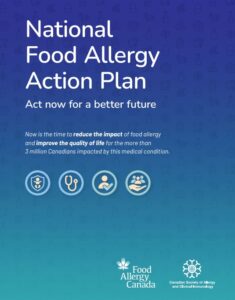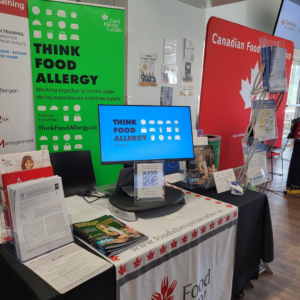Hot off the press! Read the recently updated National Food Allergy Action Plan and learn about our meetings in Ottawa. Plus, learn about our advocacy efforts in foodservice, and with Canada’s National School Food Program! Plus, discover the latest in research on epinephrine products.
Advocacy in action: National Food Allergy Action Plan update

To better support Canadians impacted by food allergy and the people who care for them, we in partnership with the Canadian Society of Allergy and Clinical Immunology (CSACI), launched an updated, comprehensive, and evidence-based National Food Allergy Action Plan with recommendations for policymakers.
“This plan offers a path forward for Canada to strengthen prevention measures, diagnosis capacity, treatment, and supports for children and adults with food allergy, and reduces pressure on our public healthcare system,” notes Jennifer Gerdts, Executive Director of Food Allergy Canada.
Among the specific recommendations offered in the National Food Allergy Action Plan, we are calling for federal leadership in:
- Building public awareness of anaphylaxis and how to treat it
- Taking action to mitigate the risk of drug shortages and prioritizing the review of new epinephrine delivery systems: Canada is currently vulnerable to epinephrine auto-injector shortages with just one manufacturer (EpiPen®)
- Guidance mandating prevention of food allergy as a public health priority
- Working with the provinces to develop a care pathway that supports hesitant parents/caregivers in early introduction of allergenic foods to infants, and early treatment for those who have an allergic reaction, along with better access to current treatment options for all ages
- Helping to ensure Canadians have access to accurate ingredient information so they can make safe and informed choices, regardless of where they eat
Next steps

This past week, we met with Senators, MPs, and policymakers at Parliament Hill to raise awareness of food allergy and the need for federal leadership to support the National Food Allergy Action Plan. The discussions focused on improving support for prevention, diagnosis and treatment, access to accurate ingredient information, and ensuring children with food allergy are included in the federal government roll-out of the National School Food Program.
We look forward to continuing the dialogue, and will keep you updated as we progress on advocacy efforts.
Advocacy in action: Ensuring the foodservice industry is equipped

This month, we made significant strides for the food allergy community at the Canadian Institute of Public Health Inspectors (CIPHI) Ontario Conference. For three impactful days, we shared our new Think Food Allergy tools and resources with over 300 public health inspectors from across Ontario.
Our presentation emphasized how inspectors can utilize our materials to strengthen allergen management in the foodservice industry. By empowering them to share this vital information, we are helping foodservice establishments to be better equipped to meet the needs of the food allergy community.
Together, we are shaping a safer food landscape and ensuring that those with food allergy are better safeguarded!
Check out our resources and share with foodservice establishments.
Advocacy in action: Food allergy is now a consideration within Canada’s School Food Policy
The federal government has announced a new National School Food Program aimed at improving students’ access to safe and nutritious food, helping them grow and reach their full potential.

As part of this program, a new policy was developed called Canada’s School Food Policy. This policy outlines the long-term vision for school food programs in Canada, and the guiding principles and objectives for future program development.
Many of you contributed to the 2022 government consultation that helped shape this new policy. We are excited to share that, thanks to our advocacy efforts and your collective voices, food allergy considerations have been included in the recommendations for school food offerings, ensuring better inclusion for students at risk of anaphylaxis!
We will continue to follow the developments on this program as it rolls out across Canada.
Research: Epinephrine products to treat anaphylaxis
Check out an update on epinephrine products that were presented at the 2024 American College of Allergy, Asthma & Immunology’s (ACAAI’s) Annual Scientific Meeting held at the end of October.
New developments in needle-free epinephrine products
Epinephrine nasal products

ARS Pharmaceuticals showcased a range of studies focused on intranasal epinephrine administration, including cardiovascular safety, human factor study of carrying two devices at all times to examine how people interact with the nasal spray, and real-world administration data in paediatric patients. Read the press release.
Belhaven Biopharma presented findings from its Phase 1 study on Nasdepi®, an intranasal epinephrine powder, which demonstrate its potential as a safe, non-invasive alternative to traditional intramuscular epinephrine administration for treating anaphylaxis. Read the press release.
Epinephrine sublingual film

Aquestive Therapeutics announced positive results from its Oral Allergy Syndrome (OAS) challenge study for its Anaphylm™ epinephrine sublingual film.
According to their president and CEO, “Anaphylm demonstrated its ability to resolve symptoms following the introduction of an oral allergen. This is a critical finding as we advance towards our NDA submission, as it confirms Anaphylm’s potential effectiveness in real-world allergic scenarios.” Read the press release.
We’ll continue to keep you updated on developments in needle-free epinephrine products.
Tags: Anaphylm, foodservice, Nasdepi, National Food Allergy Action Plan, National School Food Program